Funding application for 2022 – 2023 are now open Apply Now
Member Portal
Not a member? Join us here
December 2022
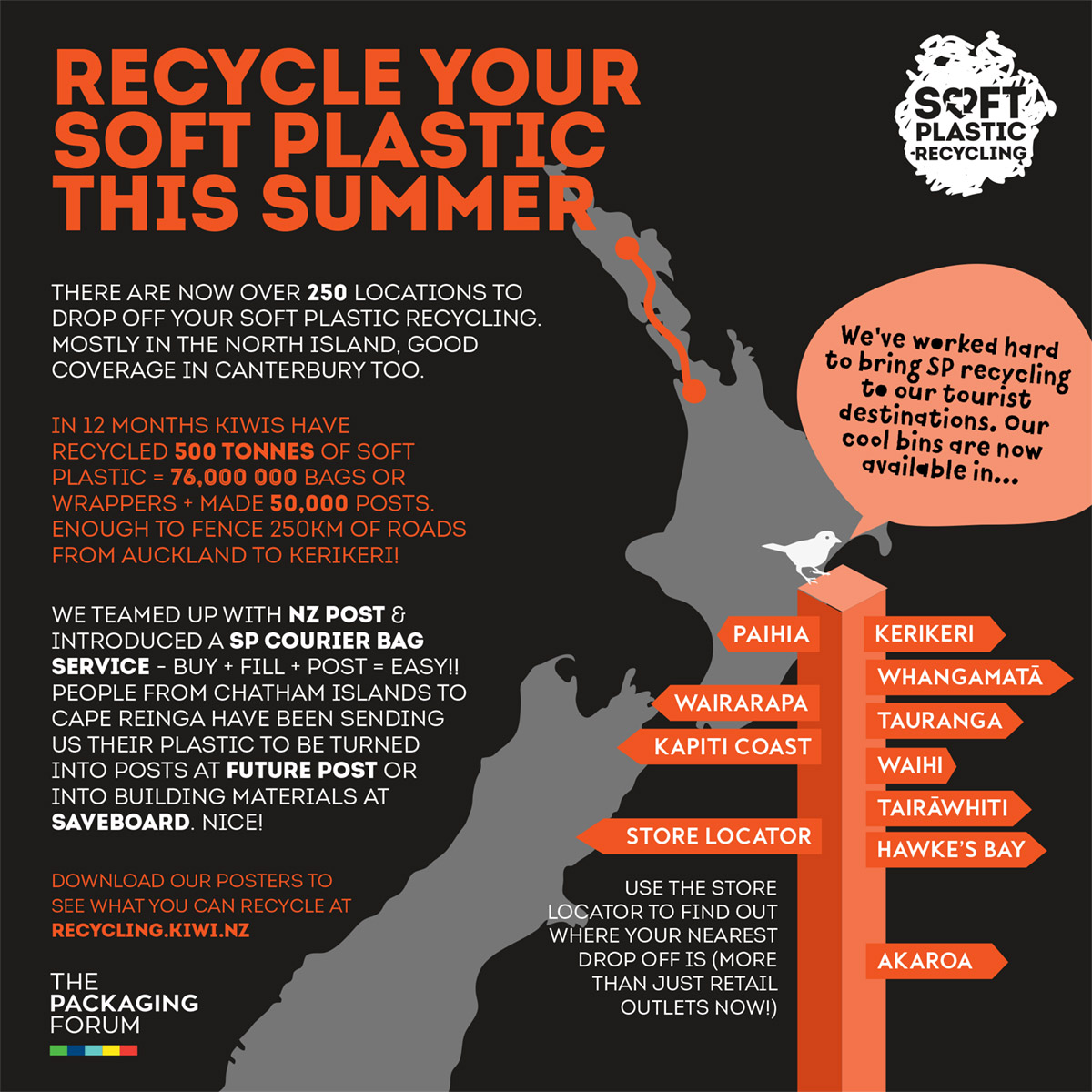
Mondelēz International will now source recycled plastic for its range of Cadbury chocolate blocks sold in New Zealand and Australia.
17 September 2021
Advanced recycling technology has enabled Cadbury to source the equivalent of 30 per cent of the plastic needed to wrap Cadbury Dairy Milk family block range from recycled sources.
The volume of recycled plastic being used is enough for 50-million family blocks of Cadbury Dairy Milk Chocolate which – if laid end-to-end – would stretch from Auckland to San Francisco.
A recent survey on public place recycling and litter has seen a mixed bag of results, with awareness around public bins increasing but willingness to make extra effort to use them declining.
07 April 2021
The survey, conducted in early March by Horizon Research for The Packaging Forum, also found more people believe there is a problem with litter where they lived, compared with a year earlier.
The survey spoke to over 1,200 people about public place recycling and rubbish bins and found the number of people who have access to public bins continued upwards to 2.4 million adults (66% of respondents). This was an increase of 2% on 2020 and 25% from the first survey in 2014.
Bins to make recycling easier, better
The Packaging Forum CEO Rob Langford says they have been working over recent years to rollout new colour-coded bins which help making recycling and disposing of rubbish easier to get right.
“There are a lot of people who want to do the right thing and recycle, but don’t have the information to do so correctly which causes unintended contamination issues. With the right information they have the potential to have a hugely positive impact.”
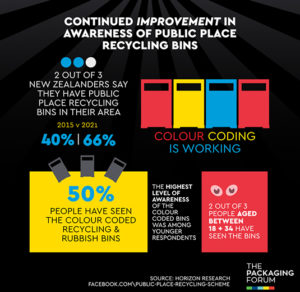
While awareness of these colour-coded bins declined slightly to 50%, it was still well up from 37% in 2019.
“The Covid-19 pandemic has had an impact and the research shows a drop in awareness where the bins were removed during lockdown but have not been returned,” Rob says.
It was very encouraging to see awareness was highest among people aged 18 to 24, he says. “Those aged 75 and over had just as much awareness, so it’s the group in the middle where more focus is needed.”
The colour-coded bins have continued to be very effective, Rob says, with 81% of people reporting they made knowing what to recycle and what to put in the rubbish easier. “This has been the consistent response over the past three years, so the design is working.”
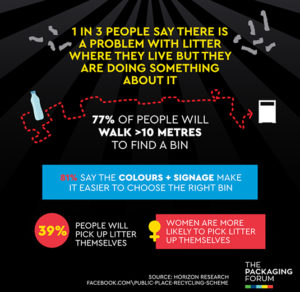
More litter, less effort
He says it was interesting to see that while litter was perceived as more of a problem, with 34% people agreeing it was (up 5%), individuals were less likely to make an extra effort to use public bins. The report showed 28% of people would walk more than 40 metres to find a bin, down from 37% in 2020.
However, while attitudes towards telling someone else to pick up litter they had dropped changed little from 2020, people were slightly more likely to pick up litter themselves – up 3% to 39%.
MEDIA RELEASE: Taranaki residents will be able to recycle their soft plastics for the very first time, with collection bins being made available at Countdown Hāwera, Stratford, Spotswood, New Plymouth Central, The Valley and Vogeltown from 19 October.
16 October 2020
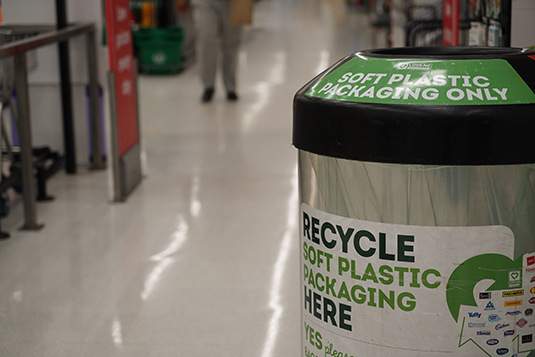
This latest expansion will mean there will be over 100 locations offering a drop-off service for soft plastic bags and wrappers throughout New Zealand from Taranaki up to Northland and around the Wellington region.
Lyn Mayes, Scheme Manager says: “It is fantastic to bring soft plastic recycling to the Taranaki district for the first time. Based on experience shoppers will recycle more than 25 tonnes of soft plastic or 4 million bags or wrappers every year.
“Countdown will bale the soft plastic at the back of their stores and transport it back on their returning store delivery vehicles to Auckland where it will then be sent to Future Post to be turned into plastic posts.
“Future Post has more than doubled its processing capacity thanks to new sales with local and central government departments and industry. We are doing what we promised and expanding the number of stores and our geographic coverage so that we can meet Future Post’s demand for soft plastic materials. Everything we collect is recycled here in Aotearoa.”
The Soft Plastic Recycling Scheme has over 80 members representing around 74% of the soft plastic materials consumed annually. The scheme pays for the costs of collection through to processing.
Countdown’s General Manager Corporate Affairs, Safety & Sustainability, Kiri Hannifin, says: “We’re working to extend the scheme to as many of our stores as possible, because we recognise the hugely important role it plays in reducing waste to landfill. This is the very first time we will have soft plastics recycling available to our Taranaki customers and we’re really pleased to be able to offer a recycling option for packaging that would otherwise end up in people’s rubbish bins!”
Neil Holdom, New Plymouth District Mayor has welcomed the initiative: “This is a fantastic, forward-thinking partnership and a great example of Kiwi ingenuity in how to deal with those hard-to-recycle soft plastics. We’re on a journey to Zero Waste and we’re 100% behind projects that boost recycling and cut down what goes to landfill. It’s great to see Taranaki now in the Soft Plastic Recycling Scheme and I encourage all residents to use the collection bins at Countdown stores.”
This recycling service is 100% funded by industry members of the voluntary product stewardship scheme.
MEDIA RELEASE: New Zealand’s largest member-based packaging organisation has appointed its inaugural CEO.
1 October 2020
Rob Langford, who served as The Packaging Forum’s Independent Chair prior to his new appointment, took the reins as its first chief executive on 1 October 2020.
Rob says he’s looking forward to beginning his new role, which he believes will flow seamlessly from that of Independent Chair. “This is an exciting time for the future of sustainable packaging in New Zealand, one in which industry has the responsibility to lead and show the way.”
Adele Rose, who has been acting as the Forum’s interim General Manager, says Rob’s appointment comes at a time when there is ever-increasing pressure across society for businesses to become more sustainable. The Forum researches, creates and advocates for evidence-based sustainable packaging solutions.
“In the past few years the pace of change and level of engagement with Government, communities and other stakeholders has increased, making a full-time leadership role essential,” Adele says. “The Packaging Forum represents the depth and breadth of the industry, and its members are dedicated to finding sustainable solutions for their packaging.”
Rob brings decades of experience to the new role, including technical expertise and design development skills to solve complex issues, Adele says. He leads a team which already delivers two Government-accredited product stewardship schemes – the Glass Packaging Forum and Soft Plastic Recycling Scheme.
“The Forum also has a number of technical advisory groups working on end-of-life and circular economy solutions for various types of packaging, and labelling,” she says. “The appointment of Rob as our CEO will bring cohesion to all of our activities, some of which rely extensively on members who generously volunteer their time and expertise.”
Recent Government announcements declaring single-use plastic packaging a priority product under the Waste Minimisation Act 2008, and a proposed phase-out of hard-to-recycle plastics and some single-use plastic items, have helped accelerate work being done by the Forum.
“We certainly support these moves by Government as they align with our members’ commitment to better environmental outcomes for their packaging. However, it’s important for industry to have a voice in the decision-making process so its collective experience, know-how and expertise can help bring about the best possible outcomes.”
Para Kore and WasteMINZ have consulted with speakers of te reo Māori from local iwi, community groups, councils, universities and government departments to arrive at some agreed-on translations and some alternatives. As regional variations are still possible, WasteMINZ suggests consulting locally where possible for those intending to create signage or material. For the full resource kit, including recycling symbols, visit the WasteMINZ website.
Below are a few te reo Māori kupu that relate to recycling and packaging. For the full list, including other types of waste, see the WasteMinz website.
Bags & Wrap – Pēke, Tākai
Bottles & Jars – Pātara, Ipu Karaehe (glass containers)
Cans – Kēne
Cardboard – Kāri Mārō
Clear – Kōataata
Containers – Ipu
Drink – Inu
Food Scraps – Para Kai
Food Scraps & Compostable Packaging – Para Kai, Tākai Pōpopo
Furniture – Taputapu whare
Garden Cuttings – Tapahanga Māra, Tapahitanga Māra
Glass – Karaehe Karāhe, Kōata
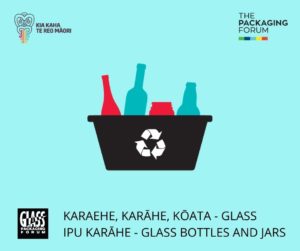
Landfill – Ruapara
Milk Bottles – Pātara Miraka
Paper – Pepa
Plastic – Kirihou
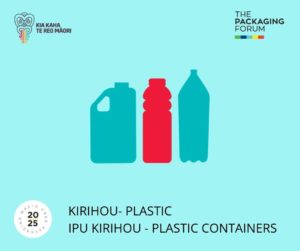
Polystyrene – Kirihou Kōmāmā
Recycling – Hangarua, Hakarua is Ngāi Tahu dialect for Hangarua
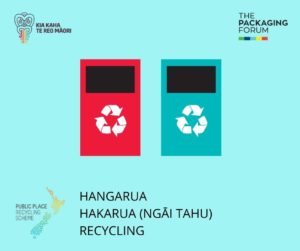
Reuse – Whakamahia Anō
Rubbish – Para, Rāpihi
Shopping Bags – Pēke Hokohoko
Soft Plastic – Kirihou Ngohengohe
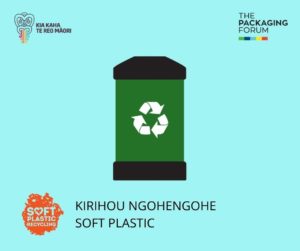
MEDIA RELEASE: With Future Post doubling its processing capacity, the Packaging Forum’s Soft Plastic Recycling Scheme will be adding 15 Countdown stores to the scheme’s collection network.
11 September 2020
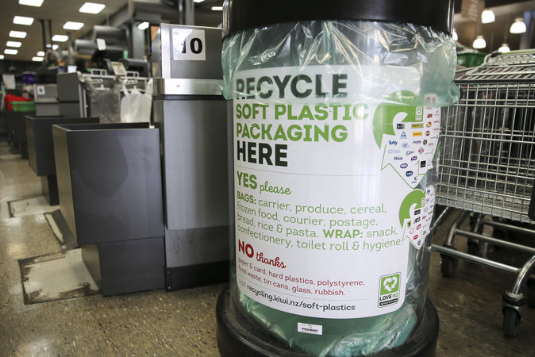
From Monday 14th September, collections bins will return to Auckland Countdown stores in Orewa, Helensville, Henderson, Northwest, Northcote, Sunnynook, St Lukes, Three Kings, Beachlands, Mangere Mall, Manukau City Mall, Roselands and in Northland to Countdown Kaikohe, Paihia Central and Regent (Whangarei).
This expansion means that there are almost 100 locations now offering a drop off service for soft plastic bags and wrappers across Upper North Island and in the Wellington Region. This recycling service is 100% funded by industry members of the voluntary product stewardship scheme.
Chair of the scheme Malcolm Everts says: “This year despite the disruption caused by COVID-19 we have increased the number of stores and regions serviced by the scheme. This has been made possible because of the increased demand for our soft plastics from our New Zealand processing partners.”
“Future Post has more than doubled its processing capacity this year thanks to new sales with local and central government departments and industry. The more demand for the products manufactured from our soft plastic waste, the more we can and will collect for recycling.
“We encourage everyone that has access to one of our participating stores to drop off their clean and dry plastic bags and wrappers so we can recycle them.”
Chris Meyer, General Manager of Future Post says: “Forty-five tonnes of soft plastics were processed at our plant in July. That’s equivalent to around 7.5 million bread bags, chip packets, frozen food bags or toilet roll wrappers diverted from landfill. Our posts are now in vineyards, farms, parks and private land from Northland to Southland. We have added new products such as square posts, Vege Boxes for gardens, and parking stops to our range.”
Countdown’s General Manager Corporate Affairs, Safety & Sustainability, Kiri Hannifin, says: “It’s been fantastic to see more and more of our stores with their soft plastics recycling bins out for our customers and we’re really excited to see how quickly Future Post’s operations are growing.
“The more opportunities we can give our customers to recycle these sorts of plastics, the better. We’re working closely with the scheme to extend to even more stores in the coming months.
MEDIA RELEASE: The Packaging Forum welcomes Government’s latest move to phase-out difficult to recycle and unnecessary plastic packaging.
12 August 2020
However, the Forum’s Independent Chair Rob Langford cautions that great care must be taken to avoid any unintended consequences caused by producers and retailers moving to other packaging types such as a mass shift to compostable packaging without standards, labelling and end-of-life solutions being in place.
The Forum was reacting to the announcement by Associate Minister for the Environment Eugenie Sage today (12 August) that consultation would begin on the phase-out of a number of plastic products, such as straws, PVC food and beverage packaging, plastic tableware, and plastic cotton-buds among others.
Consultation would run until 4 November 2020.
“It’s good to see there is a long consultation period for this and we’ll certainly be part of the conversation on behalf of our members,” Rob says. The Packaging Forum, with more than 200 members, is New Zealand’s biggest member-based organisation representing the depth and breadth of the packaging industry.
While compostable packaging can be viewed by the public as something of a ‘silver bullet’, Rob warns there are also challenges with it. “For manufacturers, there is no defined use-case for compostable packaging.
“There is no New Zealand standard as required by the organic certified composters and few commercial composters which will accept it due to contamination, and there are varying requirements for home compostability. This makes it difficult for consumers to identify how to dispose of it at end of life.”
To assist members, the Forum has a compostable packaging and a fibre-based packaging technical advisory group which is investigating solutions for these challenges to remove the barriers for compostable packaging across the supply chain, Rob says.
“We welcome the opportunity to submit during the consultation period. Our members will be able to offer their knowledge and know-how to help ensure we have the best possible outcome.”
With recent regulation of plastic packaging as a priority product, all producers and importers of goods in plastic packaging will have to get on board with product stewardship. What does that mean for business? Rob Langford, Independent chair of The Packaging Forum explains.
4 August 2020
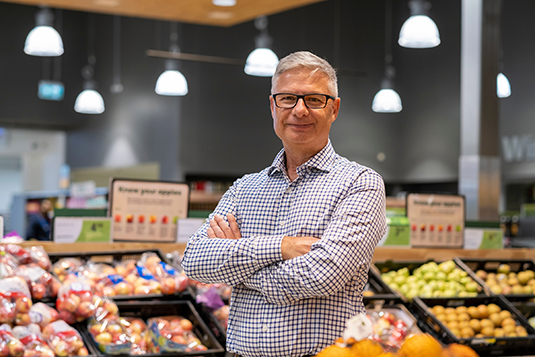
Business isn’t known for welcoming government regulation, but the news that plastic packaging will be regulated is cause for celebration by all of us who care about our impact on our environment.
That includes businesses already contributing to better environmental outcomes for their packaging and shouldering the cost through voluntary stewardship schemes. Regulation allows for the removal of ‘free-riders’ – businesses which have previously not participated.
Now all Importers, manufactures and brand owners whose goods use plastic packaging will have to contribute to schemes that address its environmental impact. So work begins designing what effective regulated product stewardship looks like in New Zealand. The Packaging Forum members are up for the challenge.
Where packaging already has a voluntary stewardship scheme, (such as The Packaging Forum’s Soft Plastic scheme), they can work to transition to a regulated model. With everyone on board, the opportunity to scale up the impact with more comprehensive solutions is exciting. For packaging types where no scheme exists (e.g. rigid plastic packaging), they will have to be designed.
We are looking forward to working on behalf of our members with the Ministry for the Environment, local government, the resource recovery sector and key community and industry groups on scheme co-design.
I believe there are clear criteria that contribute to success for a product stewardship scheme.
Whole of life cycle, circular approach
The most successful schemes don’t just deal with end-of-life solutions and aren’t just collection systems. They have whole life cycle approach. They encourage product design that removes unnecessary packaging and promotes materials which have a higher recycling value. Other aspects of the life cycle they can address are effective collection, processing infrastructure and demand for material with a high recycled content. In some cases, reusable or refillable packaging may be part of the answer.
Our Soft Plastic Recycling scheme highlights the importance of this approach. When popularity with consumers and collections quickly outgrew processing capacity, the scheme had to be temporarily suspended. New processors were found onshore who worked to develop end markets for their recycled products. The scheme is now back up and running in 74 locations across the North Island, and looking to expand further as new processing capacity develops.
Business led
Regulation simply sets the scene for solutions. Business will provide the mechanisms, infrastructure and innovation for them to be carried out. Business must lead the co-design of schemes in collaboration with local and national government, the resource recovery sector and key community groups.
Our Glass Packaging Forum scheme has shown that collaboration with key stakeholders for investment in pragmatic solutions can have a big impact. Our grant funding to bolster efficiencies in the South Island saw over 340% growth in the volume of glass returned for recycling through one processor alone between 2017 and 2019. It’s investment like this that has helped it reach a recovery rate of over 70% of container glass for recycling and reuse.
Easy for consumers
While there will always be people who choose not to recycle, the more convenient it is, the more likely they are to do it. Whether it’s access to kerbside recycling, clear and useful recyclability labelling, or colour-coded recycling bins in public places, consumer engagement is a must-have in any stewardship scheme.
Onshore solutions
We’ve seen what happens when there is too much reliance on overseas recyclables markets. A lack of onshore capacity left New Zealand and much of the world exposed and sending recyclables to landfill when other countries effectively shut the door. Taking responsibility for our own packaging onshore isn’t just the right thing to do, it’s an investment in employment opportunities and New Zealand’s economic resilience.
The right packaging choices protect our food, our goods, and us. Now we have an opportunity for those choices to keep our environment safer from harm too.
MEDIA RELEASE: Single-use plastic beverage containers, such as plastic bottles, are included in the Government’s latest announcement to tackle the country’s poor record on waste reduction, says The Packaging Forum Independent Chair Rob Langford.
30 July 2020
His comment is in response to Greenpeace’s statement shortly after the announcement they were disappointed, “the new scheme doesn’t tackle one of the country’s biggest plastic pollution problems – single-use drinks bottles.”
The Packaging Forum is the country’s biggest packaging industry member-based organisation.
The remarks follow the announcement by Associate Minister for the Environment Eugenie Sage that six product categories, including plastic packaging, have been declared priority products under the Waste Minimisation Act. This triggers the creation of regulated product stewardship schemes to manage these products throughout their lifecycle, especially at end of life through reuse, recycling or proper disposal.
Rob says single-use plastic beverage containers do fall under the category of ‘plastic packaging’ announced by the Minister. “It’s important to understand no regulated product stewardship schemes have yet been established for the multitude of packaging types which are affected.
“A container return scheme is being developed as a possible option for stewarding beverage containers, which I am involved in, but the group working on this is yet to report to the Ministry. The announcement made by Minister Sage was about what would be included in regulated stewardship schemes, not how they would be stewarded.”
The Forum had welcomed the announcement as regulated stewardship is a highly effective way of dealing with packaging and is the most significant move to date by a New Zealand government in the war on waste, Rob says.
“Successful product stewardship schemes are not just collections systems. They must address the entire lifecycle of packaging material – including product design that minimises waste, collection systems, labelling that is clear and meaningful for consumers, onshore recycling infrastructure, through to genuine and valuable use of recycled products. A circular, evidence-based and industry-led approach is critical,” he says.